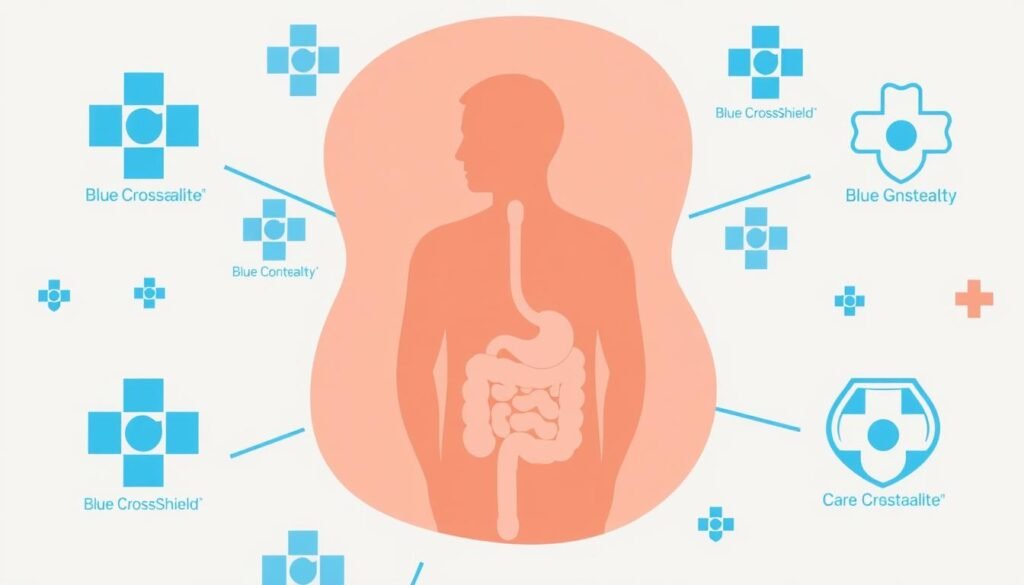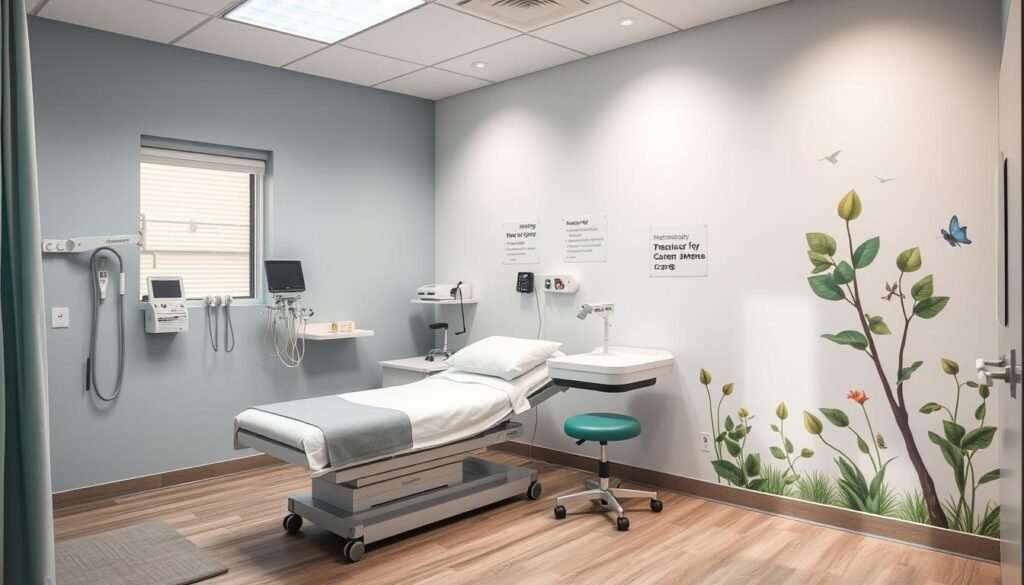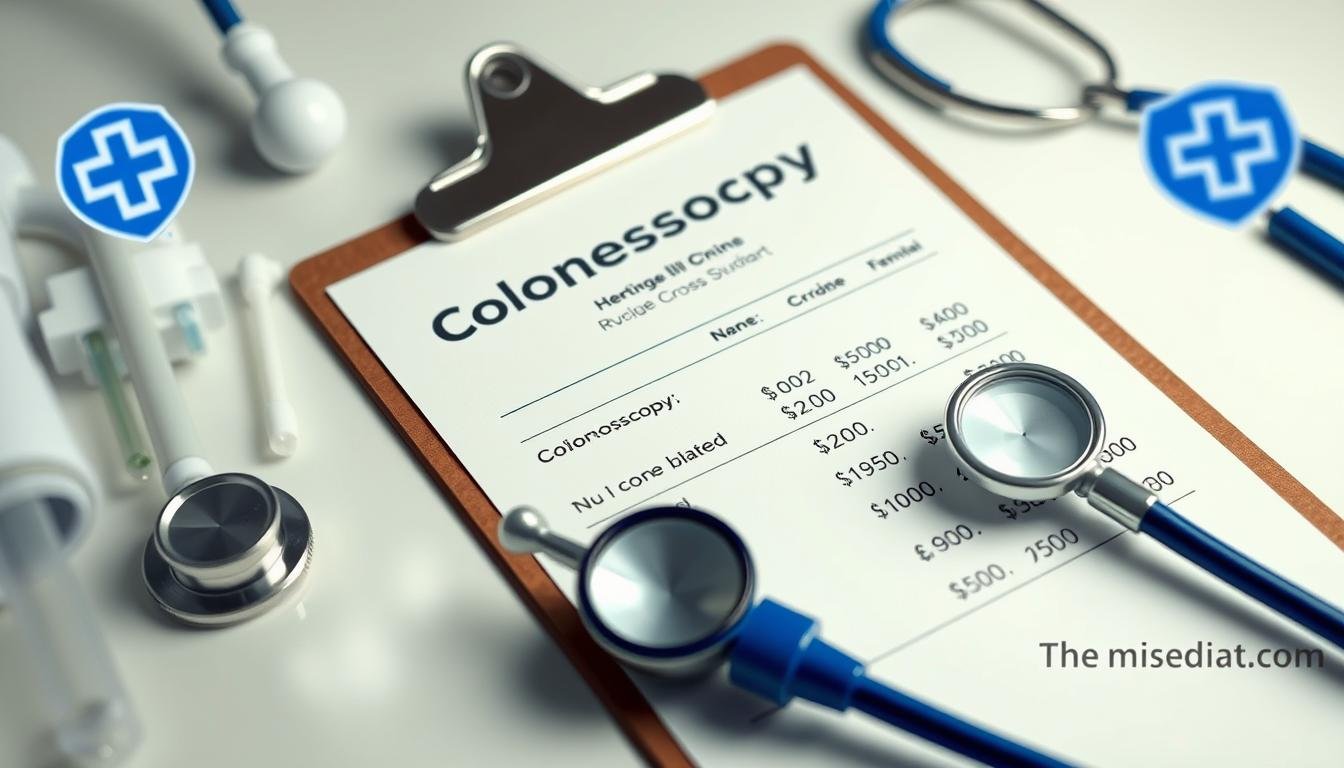Preventive screenings like colonoscopies are key to fighting colorectal cancer, the second-leading cause of death in the U.S. If you have Blue Cross Blue Shield (BCBS) insurance, you might wonder about the cost of a colonoscopy. The cost could surprise you and affect your healthcare spending.
Key Takeaways
- Blue Cross Blue Shield plans usually cover colorectal cancer screenings as a preventive service.
- Coverage for colonoscopies can change based on your age, who you see for care, and how often you get the test.
- Colonoscopies are often more expensive in hospital outpatient settings than in ambulatory surgery centers or doctor’s offices.
- Site-neutral payment policies could save a lot of money for patients, businesses, and taxpayers on colonoscopies and other outpatient care.
- BCBS supports laws to make hospital billing fair and lower healthcare costs.
Understanding Colonoscopy Coverage with Blue Cross Blue Shield
Blue Cross Blue Shield (BCBS) has rules for colonoscopy coverage. It knows the difference between first-time and follow-up colonoscopies. BCBS guidelines say the first colonoscopy for colorectal cancer screening is free. It’s covered as a preventive service under the Affordable Care Act (ACA).
Initial Diagnostic Colonoscopy
The first colonoscopy is for screening colorectal cancer. BCBS covers it fully. This includes bowel prep, sedation, lab work, and facility fees. The member doesn’t pay a deductible, copay, or coinsurance.
Follow-Up Colonoscopy After Abnormal Results
If the first colonoscopy finds something abnormal, you might need a second one. BCBS covers these follow-up colonoscopies too. They don’t charge the member if billed correctly with the right modifier.
It’s important to bill correctly and use the right modifiers. This makes sure the follow-up colonoscopy is covered right. The member won’t have to pay out-of-pocket.

Knowing about BCBS’s rules for colonoscopies helps members get care without surprise bills. Regular screenings, like colonoscopies, help catch colorectal cancer early. This is key for prevention.
Preventive Screening and Applicable Follow-Up Procedures
Regular preventive colonoscopy screening is key to finding colorectal cancer early. The USPSTF says adults 45 to 75 should get screened with colonoscopy every 10 years. To get it covered, the doctor must use modifier 33. This means it’s for prevention. Then, the colonoscopy won’t cost the member anything.
Colonoscopy as a Preventive Screening
People at normal risk should start preventive colonoscopy screening at 45. This is because more young people are getting colorectal cancer. Regular checks can find and remove polyps before they turn into cancer.
Billing with Modifier 33 for Preventive Services
- Commercial and Medicaid patients should use CPT code 45378 for a diagnostic colonoscopy and add modifier 33 to get full coverage.
- Medicare patients use HCPCS code G0105 or G0121 for colorectal cancer screening colonoscopies if they’re at high risk.
- If a patient needs a colonoscopy after a positive test, add modifier 33 for commercial and Medicaid, and modifier KX for Medicare.
Using the right modifier when billing helps doctors make sure patients get full coverage. This is under their Blue Cross Blue Shield of Illinois plan.

“Regular preventive colorectal cancer screening can save lives by catching the disease early when it is most treatable.”
How much is a colonoscopy with Blue Cross Blue Shield insurance?
The cost of a colonoscopy with BCBS insurance changes based on several things. If it’s for a check-up or a follow-up after a first test, you might not pay anything. But, if it’s not seen as a check-up, you could pay deductibles, coinsurance, or copays.
The type of colonoscopy and if the doctor is in-network matter too. In-network doctors have deals with BCBS, so you might pay less. This can change how much you owe.
To know the cost of a colonoscopy with BCBS, look at your plan details. Check deductibles, coinsurance rates, and copays. Talking to your doctor and BCBS can also help you understand what you might pay.
| Procedure | Average Cost with BCBS Insurance |
|---|---|
| Colonoscopy (Preventive Screening) | $0 out-of-pocket |
| Colonoscopy (Diagnostic/Follow-Up) | Varies based on deductible, coinsurance, and copays |
Your actual colonoscopy cost might be different. This depends on your BCBS plan and where you get the procedure. Always talk to your provider and insurance to get a clear cost estimate.

Cost Variations Based on Healthcare Setting
The cost of common outpatient procedures, like colonoscopies, changes a lot based on where they are done. Studies found that colonoscopy screenings cost 32% more in a hospital outpatient department (HOPD) than in an ambulatory surgery center (ASC). They cost more than twice as much when done in a doctor’s office.
Hospital Outpatient Departments vs. Doctor’s Offices
Colonoscopy screenings can cost up to $1,224 in a hospital outpatient department. This is much more than the $611 cost in a doctor’s office, a 100% increase. Diagnostic colonoscopies also cost 58% more in HOPDs than in ASCs, with an average cost of $1,646.
Potential Savings with Site-Neutral Payment Policies
To fix these cost differences, the Blue Cross Blue Shield Association backs laws like the FAIR Act and SITE Act. These laws aim to make payment rates the same in all healthcare places. This could save patients, businesses, and taxpayers almost $500 billion over 10 years.
| Procedure | HOPD Cost | ASC Cost | Cost Difference |
|---|---|---|---|
| Colonoscopy with Biopsy | $1,766 | $1,089 | 38% higher in HOPD |
| Cataract Removal | N/A | N/A | 35% higher in HOPD |
| Ear Tube Insertion | N/A | N/A | 46% higher in HOPD |
“Implementing site-neutral payments across settings could save patients, businesses, and taxpayers nearly $500 billion over 10 years.”
Conclusion
The cost of a colonoscopy with Blue Cross Blue Shield (BCBS) insurance changes a lot. It depends on many things. Knowing about coverage, billing, and your plan is key to getting the most benefits and saving money.
It’s important to know if your colonoscopy is for prevention or diagnosis. You should also understand how often you can get it, the costs, and when coverage might be denied. Asking for fair payment policies can help you save a lot of money. This helps you and the healthcare system too.
This article tells us that colonoscopy costs can be low or very high. It depends on where you get it, the procedure type, and your insurance. By being informed and proactive, you can use your BCBS benefits well. This helps you make smart choices about your health.
FAQ
How is an initial diagnostic colonoscopy covered by Blue Cross Blue Shield (BCBS) insurance?
BCBS covers the first colonoscopy for screening without making you pay. This is under the Affordable Care Act rules. It’s for checking for colorectal cancer.
What about follow-up colonoscopies after abnormal results?
If the first colonoscopy finds something unusual, you might need another one. These extra colonoscopies are also free if billed right.
How can I ensure my colonoscopy is covered as a preventive screening?
Make sure your doctor uses modifier 33 when billing. This shows it’s for prevention. Then, you won’t pay for it.
What factors can affect the cost of a colonoscopy with BCBS insurance?
The price of a colonoscopy with BCBS depends on several things. This includes if it’s the first or follow-up test, if the doctor is in-network, and if billed as preventive. If it’s for prevention or a needed follow-up, you won’t pay. But, if not billed right, you might have to pay out-of-pocket.
How can the healthcare setting affect the cost of a colonoscopy?
Getting a colonoscopy in a hospital outpatient department costs more than in a doctor’s office or ASC. It’s 32% more in an HOPD than an ASC. And more than double the cost in a doctor’s office.
How can site-neutral payment policies help reduce the cost of colonoscopies?
Laws like the FAIR Act and SITE Act aim to make payments the same everywhere. This could save a lot of money over 10 years for patients, businesses, and taxpayers.
